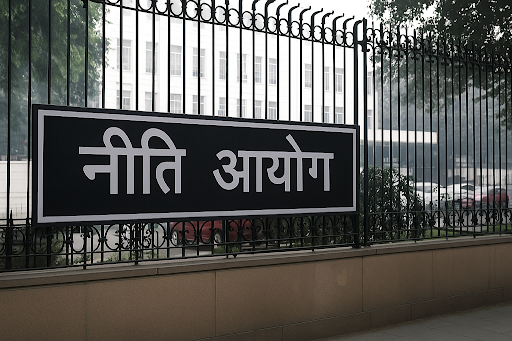



NITI Aayog’s report proposes a concessional loan scheme, enhanced R&D, and better testing facilities for medium enterprises, crucial for India’s economy. Employing 89 workers on average and driving 40% of MSME exports, these firms face high loan rates and skill gaps. The initiatives aim to boost competitiveness, innovation, and formal employment.

Copyright infringement not intended
Picture Courtesy: INDIAN EXPRESS
A new report titled ‘Designing a Policy for Medium Enterprises’ by NITI Aayog has proposed a concessional loan scheme for medium-sized enterprises.
NITI Aayog releases a report proposing targeted support for medium-sized enterprises (MEs) to help them grow and compete globally. Medium enterprises are businesses that fall between small and large companies in terms of size, investment, and turnover.
The report highlights their importance, as they employ more people per unit, and contribute to exports. However, these firms face challenges like high loan interest rates, limited access to testing facilities, and skill shortages.
The report suggests solutions like cheaper loans, better R&D support, improved testing infrastructure, and skilling programs to make these firms future growth engines for Indian economy.
Medium enterprises make up only 0.3% of registered Micro, Small, and Medium Enterprises (MSMEs). Each medium firm employs an average of 89 workers, compared to 19 in small firms and 6 in micro firms.
They account for 40% of MSME exports and 81% of MSME R&D spending, driving innovation and global competitiveness. Despite this, they face unique challenges that the report aims to address. For example, they pay 4% higher interest rates on loans than large firms and get fewer priority sector loans compared to micro enterprises. This makes it harder for them to grow or compete with bigger companies.
The Union Budget 2025 expands the definition of medium enterprises to include firms with investments between Rs 25–125 crore and turnovers between Rs 100–500 crore (previously Rs 10–50 crore investment and Rs 50–250 crore turnover).This change brings more firms under the medium category, making them eligible for the proposed support.
Cheaper Loans and Better Credit Access
Medium enterprises struggle to get affordable loans. The report proposes a dedicated financing scheme under the Ministry of MSME, allowing these firms to access loans at lower interest rates, capped at Rs 25 crore, with a maximum of Rs 5 crore per request.
It also suggests a medium enterprise credit card with a pre-approved limit of up to Rs 5 crore at market-aligned rates. This addresses the $10 billion credit gap medium firms face, as they receive fewer priority sector loans than micro enterprises.
The Credit Guarantee Fund Trust for Micro and Small Enterprises (CGTMSE) already supports micro and small firms with up to 85% loan guarantees, but medium enterprises have limited access to such schemes. The proposed scheme aims to bridge this gap, making it easier for medium firms to fund expansion, buy machinery, or manage daily operations.
Boosting Research and Development (R&D)
Medium enterprises invest 81% of MSME R&D funds, but only 22% engage in R&D compared to 60% of large firms. To encourage innovation, the report recommends reserving 25–30% of the Self-Reliant India (SRI) Fund (Rs 10,000 crore from the government and Rs 40,000 crore from private equity) for medium firms’ R&D projects.
It suggests adopting an EU-style model where the government identifies major R&D gaps and invites medium firms to propose solutions. A dedicated R&D cell within the MSME Ministry would support cluster-based projects of national importance, like developing new technologies or products.
Improving Quality Testing Facilities
Medium enterprises face delays and high costs when testing products for quality, as they depend on remote or private testing centers. This makes it harder to meet global standards and enter international markets. The report recommends expanding the Micro & Small Enterprises Cluster Development Programme (MSE-CDP) to include medium firms, giving them access to shared, sector-specific testing facilities.
This aligns with global best practices from countries like Germany and Japan, where cluster-based testing supports medium firms in maintaining high-quality standards.
Skilling and Formal Employment
Medium enterprises depends on formal workers, unlike micro and small firms, which often use informal labor. Formal employment encourages firms to train their workers, boosting productivity. However, only 55% of Indian workforce is skilled, compared to 88% in South Korea and 81% in Japan. The report suggests real-time skill mapping through the MSME Sampark Portal to identify regional and sector-specific skill needs.
It recommends expanding the Entrepreneurship and Skill Development Programme (ESDP) with customized training, such as six-week foundation courses, one-week advanced modules, and manager-level programs focused on export skills and green manufacturing.
Technology Upgrades for Industry 4.0
Medium enterprises lag in adopting advanced technologies like AI and IoT, with 82% not using Industry 4.0 tools. The report proposes upgrading MSME Technology Centres into India SME 4.0 Competence Centres, customized to industries like electronics, sports, or fragrances. These centres would help medium firms adopt smart manufacturing, improving efficiency and competitiveness.
Centralized Digital Support Portal
Medium enterprises often don’t know about government schemes or find them hard to access due to bureaucracy. The report suggests creating a sub-portal within the Udyam platform with AI-based tools for scheme discovery, compliance support, and market intelligence. This would help firms find relevant loans, subsidies, or export opportunities easily.
The MSME sector as a whole accounts for 29% of India’s GDP, 40% of exports, and over 60% of jobs. By strengthening medium enterprises, India can boost formal employment, innovation, and global competitiveness, aligning with the vision of Atmanirbhar Bharat.
Must Read Articles:
NITI Aayog Report on Future Pandemic Preparedness
Source:
|
PRACTICE QUESTION Q. Explain how cluster development programs can help MSMEs overcome infrastructural bottlenecks and improve productivity. 150 words |






© 2026 iasgyan. All right reserved